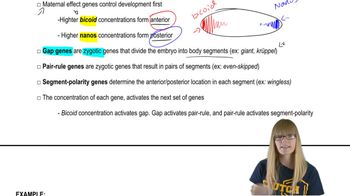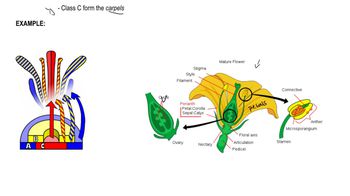Table of contents
- 1. Introduction to Genetics51m
- 2. Mendel's Laws of Inheritance3h 37m
- 3. Extensions to Mendelian Inheritance2h 41m
- 4. Genetic Mapping and Linkage2h 28m
- 5. Genetics of Bacteria and Viruses1h 21m
- 6. Chromosomal Variation1h 48m
- 7. DNA and Chromosome Structure56m
- 8. DNA Replication1h 10m
- 9. Mitosis and Meiosis1h 34m
- 10. Transcription1h 0m
- 11. Translation58m
- 12. Gene Regulation in Prokaryotes1h 19m
- 13. Gene Regulation in Eukaryotes44m
- 14. Genetic Control of Development44m
- 15. Genomes and Genomics1h 50m
- 16. Transposable Elements47m
- 17. Mutation, Repair, and Recombination1h 6m
- 18. Molecular Genetic Tools19m
- 19. Cancer Genetics29m
- 20. Quantitative Genetics1h 26m
- 21. Population Genetics50m
- 22. Evolutionary Genetics29m
14. Genetic Control of Development
Developmental Patterning Genes
Problem 27
Textbook Question
Textbook QuestionZea mays (maize, or corn) was originally domesticated in central Mexico at least 7000 years ago from an endemic grass called teosinte. Teosinte is generally unbranched, has male and female flowers on the same branch, and has few kernels per 'cob,' each encased in a hard, leaf-like organ called a glume. In contrast, maize is highly branched, with a male inflorescence (tassel) on its central branch and female inflorescences (cobs) on axillary branches. In addition, maize cobs have many rows of kernels and soft glumes. George Beadle crossed cultivated maize and wild teosinte, which resulted in fully fertile F₁ plants. When the F₁ plants were self-fertilized, about 1 plant in every 1000 of the F₂ progeny resembled either a modern maize plant or a wild teosinte plant. What did Beadle conclude about whether the different architectures of maize and teosinte were caused by changes with a small effect in many genes or changes with a large effect in just a few genes?
 Verified Solution
Verified SolutionThis video solution was recommended by our tutors as helpful for the problem above
Video duration:
2mPlay a video:
Was this helpful?
Video transcript

 11:19m
11:19mWatch next
Master Segmentation Genes with a bite sized video explanation from Kylia Goodner
Start learning


